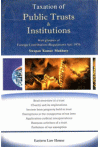- Author(s): Swapan Kumar Mukhuty
- Publisher: Eastern Law House
- Edition: Ed 2008
- ISBN 13 9788171772094
- Approx. Pages 590 + Contents
- Format Hardbound
- Approx. Product Size 21 x 14 cms
- Delivery Time Normally 7-9 working days
- Shipping Charge Extra (see Shopping Cart)
With glimpses of Foreign Contribution (Regulation) Act, 1976
.............................................................................................................................................................................................................
Description
Brief overview of a trust Charity and its implications income from property held in trust Exemptions in the conspectus of tax laws Application-judicial interpretations Business activities of a trust forfeiture of tax exemptions
Altruismand eharity have at all times and in all philosophies been regarded as expressions of high moral standard and responsible social conduct. Thus the need of preservation, support and encouragement of charitable institutions have been universally recognized. On the other side, right to Reedom of religion is enshrined in the Constitution of India and is revealed in the idea of liberty of thought, expression, belief, faith and worship in the Preamble of the Constitution. Article 26 of the Constitution also confers on every religious denomination the right to establish and maintain institutions for religious and charitable purposes. The Government has also acknowledged the vital role played by the charitable and religious trusts and institutions in the fields of education, medical care, relieving poverty, rural development, social actions, scientific research, regulation of sports and culture and public religious activities etc. by granting a unique tax treatment within the framework of Income-tax Act. The sacrifice of revenue by exempting the income from tax is an Indirect contribution of the government towards the philanthropic and welfare activities undertaken by them apart from the direct financial support by way of grants to these institutions and NGOs by different ministries of the government
.............................................................................................................................................................................................................
Contents
Part 1 : Exemption of Income of Trust
Chapter 1 : Trust - A brief overview
Chapter 2 : Preliminary - Important Definitions, Terms and Concepts
Chapter 3 : Charity and its implications
Chapter 4 : Religious purposes
Chapter 5 : Income
Chapter 6 : Voluntary Contributions
Chapter 7 : Exemption of trust in the conspectus of tax laws
Chapter 8 : Application of income - judicial interpretations
Chapter 9 : Capital gain - section (1A)
Chapter 10 : Accumulation or set-off
Chapter 11 : Specified methods of investments
Chapter 12 : Sections 60 to 63 preclude section 11
Chapter 13 : Treatment of business activities by a trust
Chapter 14 : Forfeiture of Tax Exemption
Chapter 15 : Registration under section 12AA
Chapter 16 : Compulsory audit and requirement of filing audit report
Chapter 17 : Organisations exempted under section 10
Chapter 18 : Rebate to Donors on donation made for charity
Chapter 19 : Deduction on expenditure on scientific research
Chapter 20 : Deduction on Eligible projects or schemes
Chapter 21 : Mutual benefit society
Chapter 22 : Taxability of private trusts
Chapter 23 : Assessment procedure
Chapter 24 : Miscellaneous
Chapter 25 : Formation or creation of public voluntary organisation and its management
Part 2 : Glimpses of Foreign Contribution (Regulation) Act, 1976
Part 3 : Frequently Asked Questions
Part 4 : Appendices
1. Relevant sections of the Income Tax Act, 1961
2. Relevant forms of the income tax rules. 1962
3. Excerpts from relevant important circulars on exemptions (Section wise)
4. Important forms of foreign contribution (Regulation) rules, 1976
5. Miscellaneous
6. Model deeds
.............................................................................................................................................................................................................
Author Details
Swapan Kumar Mukhuty

